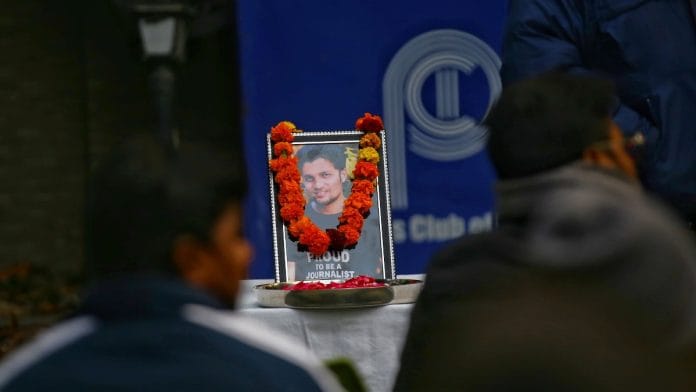New Delhi: Journalists gathered at the Press Club of India in New Delhi Tuesday to mourn the death of Chhattisgarh scribe Mukesh Chandrakar and protest the growing dangers faced by reporters in conflict zones.
The meeting highlighted Chandrakar’s courageous work, his journey, the systemic challenges confronting independent journalism, and the urgent need for reforms to protect media workers.
“This is not just the murder of a person; it’s the murder of freedom of expression,” said Gautam Lahiri, president of the Press Club of India. “We appeal to the government to enact proper laws to protect journalists. Without such safeguards, India cannot claim to be the mother of democracy.”
He pointed to the unresolved murder of Gauri Lankesh as a stark reminder of the “systemic failures” in ensuring justice for journalists.
Chandrakar, 28, went missing on 1 January in Bijapur, and his mutilated body was found two days later in a septic tank on a property owned by Suresh Chandrakar—a contractor whose alleged corruption he had exposed.
His postmortem revealed gruesome injuries, including a broken neck, fractured ribs, and head trauma. Police have arrested the contractor and two others in connection with the murder.
Mahtab Alam, a journalist who spoke at the meeting, underscored the risks of reporting from volatile regions like Chhattisgarh. “Living in Bastar and reporting from there is not easy. Mukesh’s death is not the first, and as far as I know, it might not be the last. If Mukesh doesn’t get justice, the deaths of journalists will continue,” he said. Alam also emphasised the longstanding demand for a law to protect journalists in Chhattisgarh, which remains unfulfilled.
Speakers at the meeting emphasised the need for systemic reforms, noting that if the government did not take action against Chandrakar’s perpetrators, such deaths would continue. Lahiri urged all stakeholders to come together to prevent future tragedies and demanded better wages and protection for stringers and freelancers, who often operate without institutional support.
Senior journalist Ravish Kumar highlighted the chilling effect of such murders on young reporters. “Mukesh’s murder is not just the loss of a journalist; it is the loss of his talent, his growth, and his potential. Young journalists like him will now think twice before uncovering corruption. This is the chilling effect such killings aim to create,” he said. Kumar also called for immediate support for Chandrakar’s family and structural reforms to safeguard journalists.
Kumar added that while the Press Club had done an appreciable job in gathering journalists to protest and mourn the death of a young reporter like Chandrakar, more should be done, including forming a team to inspect the working conditions of journalists, especially those who work in difficult situations. Kumar suggested a regular check on how much stringers are paid as well as how long the working hours of journalists are.
“Through a killing like this, a message is being sent to journalists to stay within their limits,” Kumar said. “But we need to fight. We need to continue talking about it.”
Of struggle and courage
Mukesh Chandrakar was born in Basaguda, a remote village in Bijapur district, at the peak of the Naxal insurgency. His father died when he was a child and he was raised by his mother under the shadow of violence, frequently moving between refugee camps. To support his family, he initially worked odd jobs, including collecting mahua flowers and working in a garage. Despite these hardships, he turned to journalism in his 20s, believing in its power to bring change.
Ashutosh Bhardwaj, Chandrakar’s colleague from Bastar, was among the journalists who paid tribute at the event. Highlighting Chandrakar’s journey, Bhardwaj said, “In such a situation, making a career in journalism was very difficult but he knew he had the potential.” He added that Chandrakar would write for newspapers in Delhi, where his bylines would often be stolen by big reporters from the city.
That was when Chandrakar realised it was time to create a bigger platform for himself and hence, decided to start his own YouTube channel, “Bastar Junction”. It became a platform for exposing corruption and amplifying local voices.
At the time of his death, the channel had over 1,65,000 subscribers, a number that has since grown. “From heres his second innings started in journalism and his face got famous,” said Bhardwaj.
“He faced pressure from people and police and was constantly blackmailed. Mukesh’s death is martyrdom. Our colleagues in Bastar are saying the place where Mukesh’s body was found is now the graveyard of journalism in Bastar,” he said.
(Edited by Tikli Basu)
Also read: SIT to probe murder of Chhattisgarh-based freelance journalist Mukesh Chandrakar






